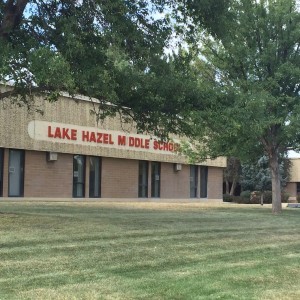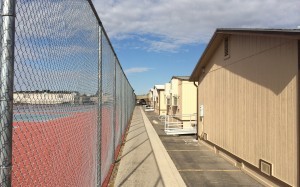
Lake Hazel Middle School began emerging from summer slumber Thursday morning.
Seventh- and eighth-grade student mentors were in a gymnasium, getting a pep talk on helping sixth-graders make the transition to middle school. Faculty members settled into the media center for a day of in-service sessions.
On Monday, this 34-year-old middle school will open its doors to a projected 1,459 students. The school was built to accommodate 1,000 students.
On Tuesday, West Ada School District voters will decide on a $104 million bond issue designed to alleviate overcrowding — especially at the middle school level.
It could be the most important school election no one is talking about.
What’s in the bond issue?

The focal point of the $104 million plan is the construction of two middle schools, with a combined cost of $60 million.
The first would open in the fall of 2016 — to ease the pressure on Lake Hazel. Located amidst a surge of suburbia south of Interstate 84, Meridian and Boise, Lake Hazel is itself sprawling. Eleven portable facilities sit near the main campus, including four that were added just last year. The school has so many portables that it was forced to move from a septic system to a sewer system.
At any given time, 300 to 400 students will take classes in a portable. That may not profoundly affect the learning experience, but overcrowding has other effects. Lunch periods are spread out over a longer period of time. The hallways are jammed, which makes it harder for faculty and staff to keep an eye on students.

West Ada, formerly known as the Meridian School District, has little choice but to build new middle school capacity, spokesman Eric Exline says. All but one of its middle schools is over capacity; based on the latest projections, the middle schools will be overcrowded by nearly 800 students.
Here’s where the rest of the money would go:
- A remodeling and expansion at Meridian High School would cost $24 million. The project is already under way. When finished, the project should have a $31 million price tag and increase Meridian’s capacity by about 240 students. This should ease some of the overcrowding already occurring at West Ada’s Mountain View and Rocky Mountain high schools.
- A new elementary school would come online in 2016, at a cost of $12 million.
- The final $8 million would be used to acquire high school and middle school sites.
Banking on growth
The mathematics of school finance is never simple, and the West Ada bond issue is no exception.
If voters say yes to the bond issue, they would commit to a long-term bond issue generating about $4 million per year. Under static circumstances, homeowners, business owners and farmers would wind up paying another $28.10 on every $100,000 in taxable property.
But actually, the taxpayer cost for the new bond issue would come to about $6.32 per $100,000 in property value.
The reason: A rebounding economy. The district’s overall property value now exceeds $14 billion, up nearly $2 billion from 2013-14. That would allow the district to spread $104 million of building projects over a broadening tax base.
And here’s where West Ada’s math gets even more complicated. Whether the bond issue passes or fails, the district says its property tax rate will drop, from $438 per $100,000 of taxable property to $399 per $100,000. The reason, again, is growth: the district will be able to spread the cost of existing levies and previous bond issues across that broadening tax base.
In essence, this is the linchpin of West Ada’s pitch. Growth — the impetus behind the bond issue — would also help offset much of the costs.
Will voters buy it?
In the district’s view, next week’s bond issue is a long time coming.
It has been nine years since voters were asked to pass a building bond issue — this $139 million proposal passed, shortly before the bottom fell out of West Ada’s extended building boom. Yet despite the recession, enrollment has continued to increase, climbing from 30,582 in 2005-06 to 36,111 in 2013-14.
While consciously putting building projects on hold during the recession, West Ada has counted on voters to approve supplemental levies to keep teachers on the job and restore classroom days. A two-year, $28 million levy passed in March — but, perhaps tellingly, came in below the two-thirds supermajority required to pass a long-term bond issue.
That levy was on the mind of a least one anonymous critic, who took to Craigslist to rip district administrators. “Vote ‘no’ on their latest bond, then let’s get board members who understand what is a luxury and what is necessary!”
And one bond issue supporter fears the proposal will fall victim to sticker shock. “I think they are asking for too much at one time,” said Jean Marion, commenting at the Meridian Press’ website. “I can see this number scaring homeowners.”
Early voting has been spotty, according to the Ada County elections office. The county has mailed out 1,300 ballots for the bond issue, and has gotten back 822. So far, only 219 people have voted early — and some of them may be voting in a school trustee recall election in Kuna.
By contrast, more than 10,300 people voted in West Ada’s levy in March.
It’s been a learning process. According to the district’s own survey, about half of the electorate didn’t live in the district for the 2005 bond issue. There’s been some confusion about the need for a bond issue, five months after the approval of a levy.
And five days from Election Day, there is no sign of organized opposition — or support.
“It’s the quietest election I’ve ever worked on. This is my eleventh,” said Exline. “I’m not sure what to think of it.”
